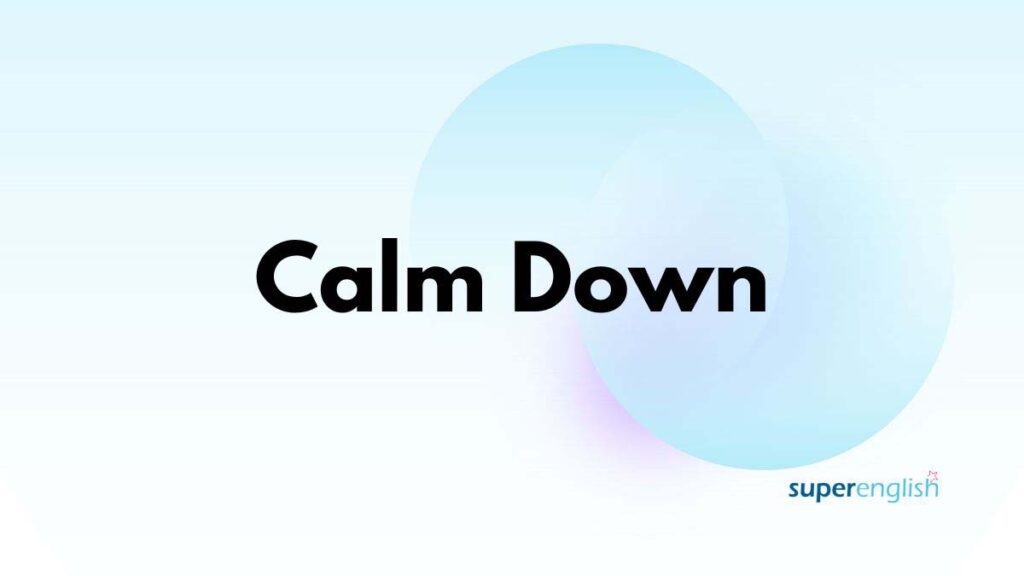
Table of Content
- Definition of Calm Down
- Forms and tenses of Calm Down
- Meaning and usage of Calm Down
- Common expressions with Calm Down
- The list of synonyms for Calm Down
- The list of antonyms for Calm Down
- 49 Example sentences with Calm Down
- The questions are related to the phrasal verb Calm Down
Definition of “calm down”: the exact definition of the phrasal verb “calm down” and how it is used in a sentence
The phrasal verb “calm down” means to become or make something or someone less agitated or less intense. It is often used to describe a process of reducing anxiety, stress, anger, or other strong emotions.
For example, you might say “I need to calm down after this long day” to describe the process of reducing your own stress or agitation. Alternatively, you might say “Can you please calm down?” to someone who is agitated or upset, asking them to reduce their strong emotions.
Here are a few more examples of how “calm down” can be used in a sentence:
- She took some deep breaths to calm down after the argument.
- The teacher asked the students to calm down and listen to her instructions.
- He tried to calm down the crying baby by singing a lullaby.
- The coach told the players to calm down and focus on the game.
- The therapist suggested some relaxation techniques to help her calm down.
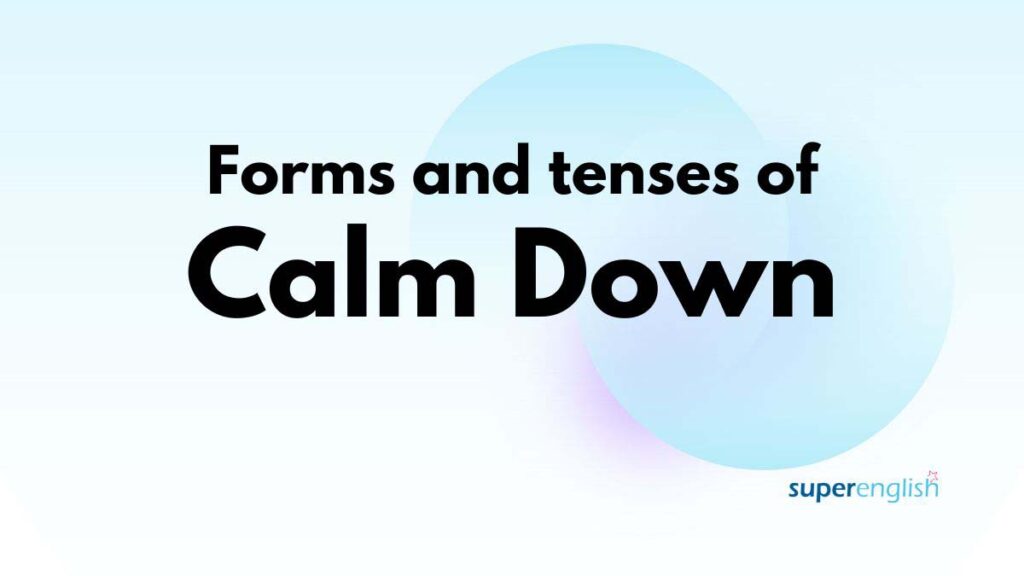
Forms and tenses: the different forms and tenses of “calm down” and examples of how to use each one
The phrasal verb “calm down” is an irregular verb, so it does not follow the usual rules for forming its different tenses. Here are the different forms and tenses of “calm down” and examples of how to use each one:
- Simple Present: “I calm down after a long day.”
- Simple Past: “She calmed down after the argument.”
- Present Continuous: “I am calming down after the stressful meeting.”
- Past Continuous: “He was calming down after the workout.”
- Present Perfect: “She has calmed down since the last time I saw her.”
- Past Perfect: “He had calmed down by the time the police arrived.”
- Future Simple: “I will calm down before the meeting.”
- Future Continuous: “She will be calming down during her yoga class.”
- Future Perfect: “He will have calmed down by the time the party starts.”
Note that the past participle form of “calm down” is “calmed down,” not “calmed.” This means that the past participle can be used to form the present perfect and past perfect tenses, as well as the passive voice. Here are some examples:
- Present Perfect: “She has calmed down since the last time I saw her.”
- Past Perfect: “He had calmed down by the time the police arrived.”
- Passive Voice: “The situation was calmed down by the security guard.”
As you can see, the different forms and tenses of “calm down” can be used in a variety of different situations to describe the process of becoming or making something or someone less agitated or intense.
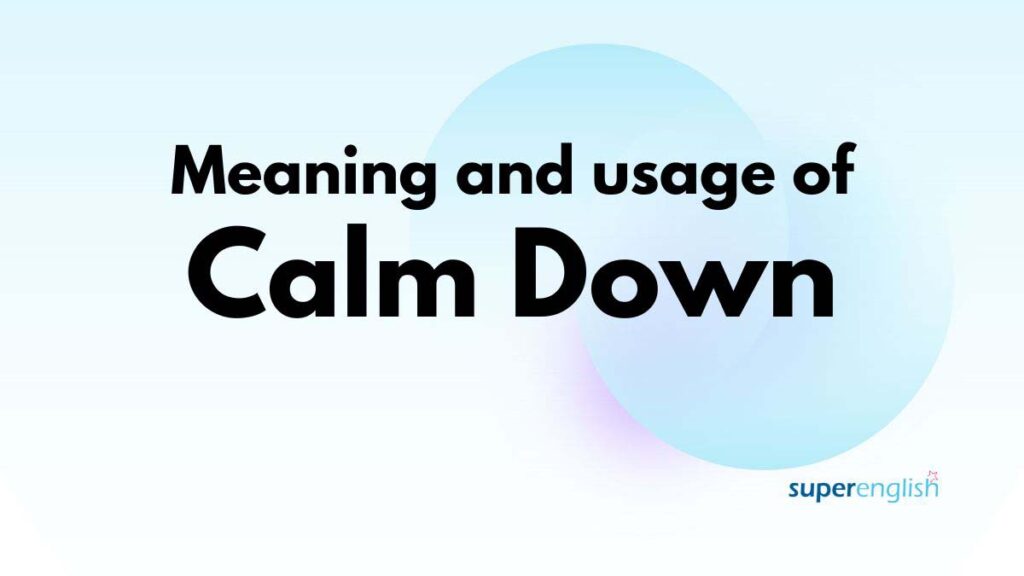
Meaning and usage: the different meanings and uses of “calm down” and examples of how to use it in different contexts
The phrasal verb “calm down” has a few different meanings and uses depending on the context in which it is used. Here are some of the most common ways that “calm down” can be used, along with examples of how to use it in each context:
- To describe the process of reducing one’s own anxiety, stress, anger, or other strong emotions: “I need to calm down after this long day.”
- To tell someone else to reduce their anxiety, stress, anger, or other strong emotions: “Can you please calm down?”
- To describe the process of making a situation or environment less intense or agitated: “The teacher asked the students to calm down and listen to her instructions.”
- To describe a person or animal that is no longer agitated or intense: “The dog calmed down after its owner petted it.”
As you can see, the phrasal verb “calm down” can be used in a variety of different contexts to describe the process of reducing anxiety, stress, anger, or other strong emotions, or to describe a person or situation that is no longer agitated or intense. Here are some more examples of how “calm down” can be used in different contexts:
- To describe the process of calming oneself down: “She took some deep breaths to calm down after the argument.”
- To tell someone else to calm themselves down: “The teacher asked the students to calm down and listen to her instructions.”
- To describe a situation that has been made less intense or agitated: “The coach told the players to calm down and focus on the game.”
- To describe a person or animal that is no longer agitated or intense: “The dog calmed down after its owner petted it.”
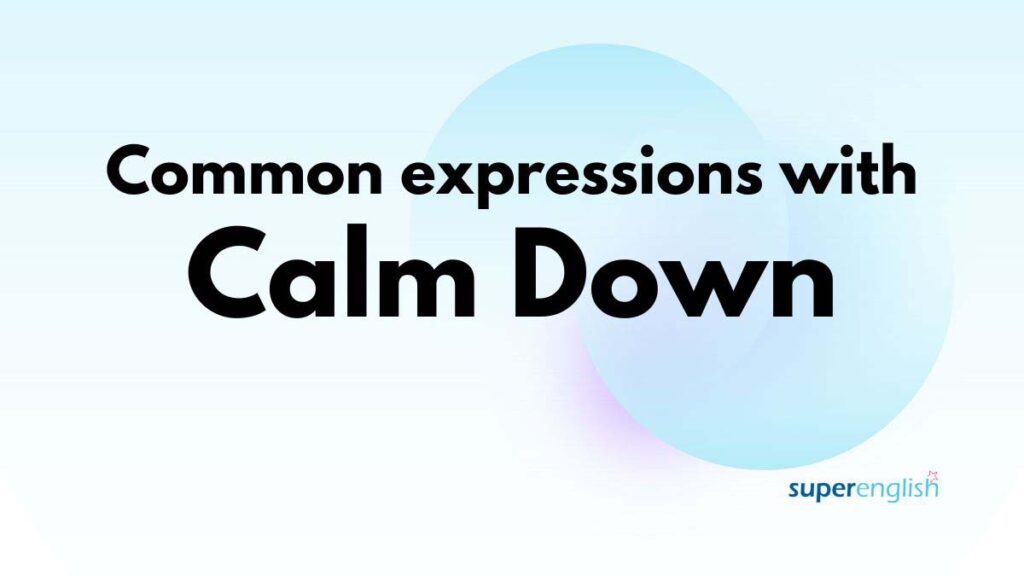
Common expressions with “calm down”: some common expressions that use “calm down” and their meanings and uses
There are a few common expressions that use the phrasal verb “calm down.” Here are some examples of these expressions and explanations of their meanings and uses:
- “Calm down, it’s not that bad”: This expression is used to tell someone who is overly upset or agitated about something to calm down and not worry so much. It is often used to try to reassure someone who is overreacting to a situation.
- “Take a deep breath and calm down”: This expression is used to tell someone to take a deep breath and try to calm themselves down. It is often used as a suggestion or piece of advice to help someone reduce their anxiety or stress.
- “Calm down, there’s no need to get angry”: This expression is used to tell someone who is getting angry to calm down and not get so upset. It is often used as a way to try to de-escalate a situation that is becoming heated or tense.
- “Calm down, it’s just a game”: This expression is used to tell someone who is getting overly competitive or upset about a game or other activity to calm down and not take it so seriously. It is often used to try to remind someone that the activity is just for fun and not worth getting upset over.
As you can see, these common expressions that use “calm down” are often used to try to reduce anxiety, stress, anger, or other strong emotions. They can be used in a variety of different situations to try to help someone calm down and relax.
The list of synonyms for “Calm Down”
These words can be used interchangeably with “calm down” to convey the idea of becoming less agitated, anxious, or excited, and attaining a state of tranquility and relaxation.
Here is a list of synonyms for “calm down”:
- Relax
- Soothe
- Unwind
- Chill out
- Settle down
- Cool off
- Compose
- Tranquilize
- Pacify
- Serene
- Reassure
- Quieten
- Mellow
- Placate
- Appease
- De-stress
- Unruffle
- Ease up
- Moderate
- Sedate
The list of antonyms for “Calm Down”
These words represent concepts opposite to “calm down” and imply actions that cause agitation, excitement, or unrest, leading to heightened emotions or tension.
Here is a list of antonyms for “calm down”:
- Agitate
- Upset
- Disturb
- Excite
- Rile
- Provoke
- Irritate
- Stir up
- Worry
- Stress
- Annoy
- Unsettle
- Frustrate
- Enrage
- Heighten
- Tense up
- Boil over
- Incite
- Antagonize
- Tumultuous
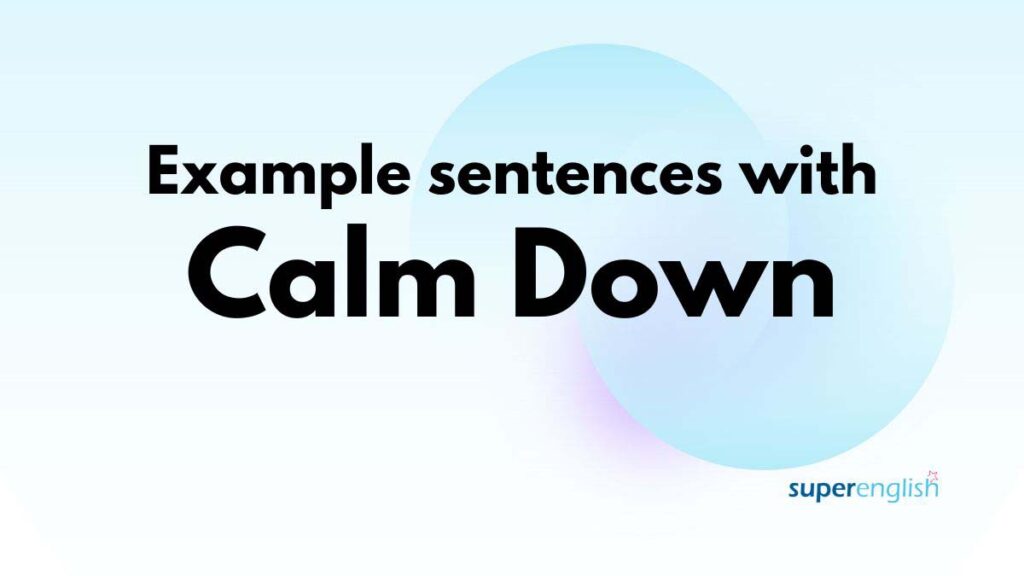
49 Example sentences with Calm Down
- Take a deep breath and calm down.
- Let’s just calm down and discuss this rationally.
- I know you’re upset, but try to calm down.
- I can’t help you unless you calm down.
- She needed a few minutes to calm down after the argument.
- He tried to calm down the crying baby.
- The teacher asked the students to calm down.
- The police officer told the angry crowd to calm down.
- The coach told the players to calm down before the game.
- The therapist suggested some techniques to calm down.
- She took a few deep breaths to calm down.
- The medicine helped him calm down.
- I need to go for a walk to calm down.
- Music always helps me calm down.
- Counting to ten can sometimes help you calm down.
- The warm bath helped her calm down.
- The dog calmed down after its owner petted it.
- He was able to calm down once he realized the situation wasn’t as bad as he thought.
- The teacher asked the students to take a break and calm down.
- The calming effect of the ocean waves helped him relax and calm down.
- She took some time to herself to calm down after the stressful meeting.
- The yoga class helped me calm down and relax.
- The security guard tried to calm down the situation.
- The mother sang a soothing lullaby to calm down the child.
- He drank some tea to calm down his nerves.
- The teacher asked the students to put down their pencils and calm down.
- The coach told the team to calm down and focus on the game.
- He took a few deep breaths to calm down before giving his presentation.
- The counselor suggested some calming exercises to help her calm down.
- The nurse gave the patient some medicine to calm down.
- The police officers used a megaphone to tell the protesters to calm down.
- The teacher asked the students to take a few minutes to calm down before continuing the lesson.
- The therapist suggested some relaxation techniques to help him calm down.
- The coach told the players to calm down and play their game.
- The teacher asked the students to close their eyes and take some deep breaths to calm down.
- The coach told the team to calm down and focus on the task at hand.
- He took a few moments to calm down before responding to the question.
- The teacher asked the students to take a break and calm down before continuing with the lesson.
- The counselor suggested some mindfulness exercises to help her calm down.
- She took a few deep breaths and counted to ten to calm down.
- The teacher asked the students to put down their pencils and take a few deep breaths to calm down.
- The coach told the players to calm down and play the game they know how to play.
- The teacher asked the students to raise their hands if they need a minute to calm down.
- The therapist suggested some calming techniques to help him calm down.
- The coach told the team to calm down and remember their training.
- He took a few deep breaths and focused on his breathing to calm down.
- The teacher asked the students to take a break and do some calming activities to help them calm down.
- The counselor suggested some relaxation techniques to help her calm down and reduce her stress. The nurse gave the patient a calming medication to help them calm down.
- The teacher asked the students to close their eyes and imagine a peaceful place to help them calm down.
The questions are related to the phrasal verb ‘Calm Down’
- Can you please ___________? You’re making me anxious. (calm down)
- She was so angry that she couldn’t ___________. (calm down)
- He was so excited that he couldn’t ___________. (calm down)
- The baby was crying, but she managed to ___________ after a few minutes. (calm down)
- The storm was raging outside, but I tried to ___________ and go to sleep. (calm down)
- The teacher had to ___________ the students before they could start the lesson. (calm down)
- After a long day at work, I like to ___________ by reading a book or taking a bath. (calm down)
- She was so nervous that she couldn’t ___________ before the interview. (calm down)
- He was so upset that he couldn’t ___________ and had to leave the room. (calm down)
- The dog was barking loudly, but I managed to ___________ it by giving it a treat. (calm down)
- The cat was hissing and scratching, but I managed to ___________ it by talking to it softly. (calm down)
- The baby was crying and fussing, but I managed to ___________ it by rocking it gently. (calm down)
- The storm was raging outside, but I managed to ___________ and go to sleep by listening to soothing music. (calm down)
- The teacher had to ___________ the students before they could start the lesson by reminding them of the rules. (calm down)
- After a long day at work, I like to ___________ by stretching and doing some deep breathing exercises. (calm down)
- She was so nervous that she couldn’t ___________ before the interview, so she practiced some relaxation techniques. (calm down)
- He was so upset that he couldn’t ___________ and had to leave the room, so he went for a walk to clear his head. (calm down)
- The dog was barking loudly, but I managed to ___________ it by taking it for a walk. (calm down)
- The cat was hissing and scratching, but I managed to ___________ it by petting it and talking to it in a soothing voice. (calm down)
- The baby was crying and fussing, but I managed to ___________ it by singing to it and rubbing its back. (calm down)
- The storm was raging outside, but I managed to ___________ and go to sleep by using a white noise machine. (calm down)
- The teacher had to ___________ the students before they could start the lesson by leading them in a relaxation exercise. (calm down)
- After a long day at work, I like to ___________ by taking a warm bath and using essential oils. (calm down)
- She was so nervous that she couldn’t ___________ before the interview, so she visualized herself succeeding. (calm down)
- He was so upset that he couldn’t ___________ and had to leave the room, so he called a friend to talk about his feelings. (calm down)
- The dog was barking loudly, but I managed to ___________ it by playing with it and giving it plenty of attention. (calm down)
